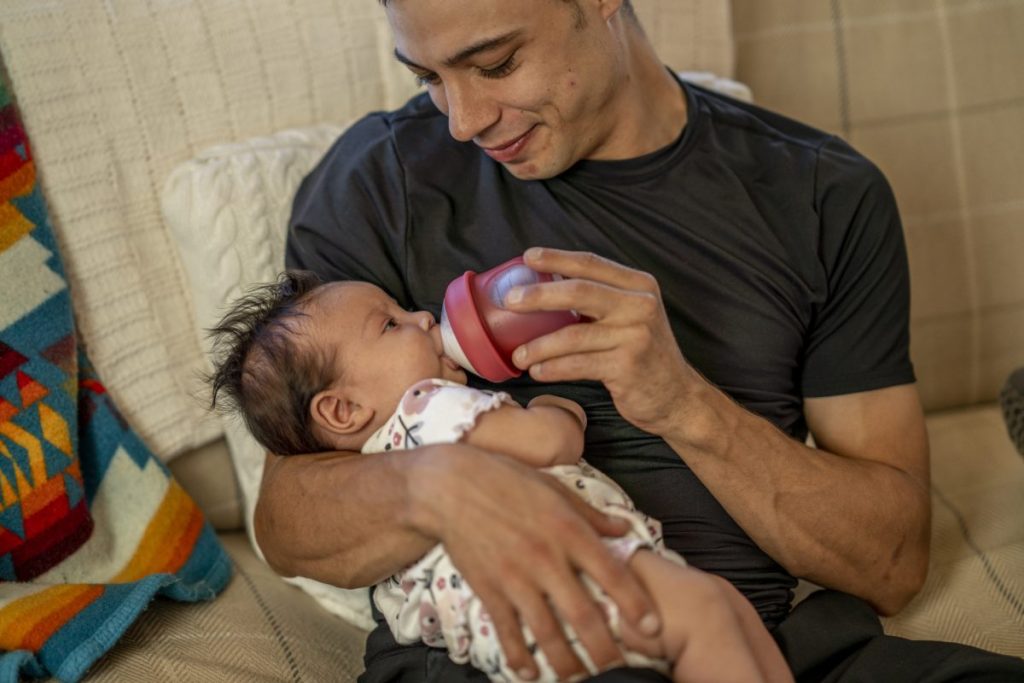
There is nothing worse than battling a lingering cold that makes you feel horrible. Thankfully, over-the-counter medicines like NyQuil cough, cold, and flu-relief products are some of the most popular nighttime remedies out there, especially for new parents looking to get some sleep when dealing with a cold. But is it safe to use NyQuil cold medicine while breastfeeding?
Some NyQuil and other similar nighttime medications can be perfectly safe for most breastfeeding, women, but that doesn’t mean you shouldn’t consult your doctor first. Although this is a complex medical topic that you should discuss with your trusted licensed medical professional, we can help with some basics for those looking for some relief and a few hours of uninterrupted sleep.

Cold medication that is safe for breastfeeding
You wake up in the middle of the night with all the usual symptoms: headache, chills, coughing, sneezing, and all-around not feeling like the top parent you usually are. We’ve all been there, but as a parent, you need to think things through that you might not have considered before.
Breastfeeding your child is important to you, and a cold isn’t going to get in the way of that. But is it safe to continue nursing if you are using over-the-counter (OTC) medications such as NyQuil? When it comes to the rules of parenting, it can be handy to check with your doctor.
What to look for
Medical professionals suggest that there is no issue taking an OTC medication such as NyQuil (or a generic version) as long as you follow one little rule – choosing a version that is clearly labeled as being “alcohol-free.”
Though the actual amount of alcohol present in OTC cough syrups and pills is quite small, the Center for Disease Control (CDC) does not recommend that nursing women consume any. Any woman who drinks alcohol, or uses an OTC cold, cough, and flu remedy containing alcohol, needs to wait at least two hours before nursing their child.

What’s in your cough medicine, anyway?
“Alcohol-free” cold medication formulations are considered safer for nursing moms, though you might consider how other drugs within these formulas can affect your child. Alcohol is actually considered an “inactive” ingredient in cough medications. This means that though it is part of the formula, it is not considered one of the essential elements of the medicine.
Depending on which product you choose, there are a variety of active ingredients in these medications. Your doctor or pharmacist is the best person to advise you on the safety of using these drugs while nursing. Many medical professionals do caution against these products if nursing a child that is less than 2 months of age.
NyQuil products are likely to contain the following active ingredients:
- Vicks NyQuil Cough Syrups and Pills – dextromethorphan, doxylamine
- Vicks NyQuil Cold & Flu Syrups and Pills – acetaminophen, dextromethorphan, doxylamine
- Vicks NyQuil Severe Cold & Flu Syrups and Pills – acetaminophen, dextromethorphan, doxylamine, phenylephrine.
Phenylephrine, for instance, has been found to reduce the amount of milk nursing women produce. Because the body is only able to absorb small amounts of it, the actual effect on milk production is quite low. Doxylamine has been found to have a similar effect on milk production while also leading to babies that are a bit crankier, sleepier, and cry more.
Though none of these active ingredients are considered particularly dangerous for nursing moms, you and your doctor can decide what is best for your family. These potential negative effects have not been recorded in all women or children, but are worth considering. If you plan on pumping milk for another adult to feed the baby while you get a much-needed nap, consider what ingredients are in the NyQuil product you choose.

Useful alternatives to consider
- Bath time for you only
- Hot comfort beverages
- Vitamin C is your friend
- Deep breathing exercises
If you are not feeling your best and unsure if a NyQuil cold & flu remedy is right for you, consider alternatives to help you sleep more soundly through your cold and also be able to take care of your baby.
Taking a hot bath offers much of the same type of relief in the way alcohol-containing cough syrups do. A hot beverage, such as black tea with honey, adds additional comfort. Vitamin C, whether taken in the form of supplements or added to your diet, also helps to fortify your immune system. Additionally, practicing deep breathing exercises can help many people feel some relief from their persistent cold symptoms.

How long after taking cold medicine should you wait to breastfeed?
Unfortunately, sometimes all a sick parent has on hand is regular medicine, like NyQuil which contains alcohol. If you inadvertently take medicine that contains alcohol or if you’re so sick you just need some sort of relief and NyQuil with alcohol is all you have handy, you may want to wait a few hours before breastfeeding. Healthline suggests waiting around two and a half hours after having any alcohol – including the small amount contained in a dose of NyQuil – before breastfeeding. Alcohol does pass through your breastmilk to your child, which can impact their weight gain, sleep, and hormones, so it’s best to avoid it altogether or wait before breastfeeding.

Making the best choice for your family
In many cases, it is safe to take NyQuil products while nursing, though some doctors do not recommend these products when nursing children younger than 2 months of age. If you have questions, consult your doctor or pharmacist.
Generally, doctors recommend that nursing women choose alcohol-free products whenever possible. Nursing moms can safely use many alcohol-free versions of popular cold, cough, and flu medications such as NyQuil to get their sleep and still feed their babies safely. Make sure you research the active and inactive ingredients in whatever over-the-counter medications you consider. But don’t be afraid to get nighttime cold medication if you are nursing – there’s no use in everyone being up all night!



